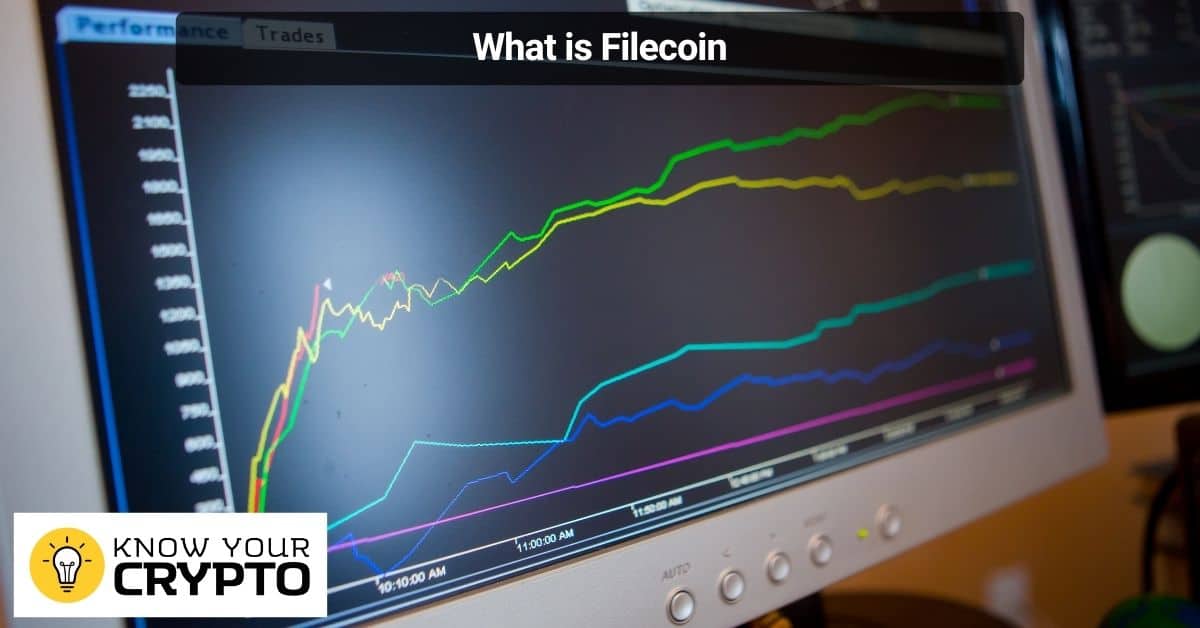Filecoin is a revolutionary new storage solution that allows users to earn money by renting out their unused storage space. Filecoin is based on the Bitcoin protocol and uses blockchain technology to create a decentralized storage network. Filecoin has many benefits over traditional storage solutions, including security, privacy, and efficiency. In addition, Filecoin is more affordable than traditional cloud storage providers. Anyone can use Filecoin to store data securely and efficiently.
What is Filecoin
Filecoin is a decentralized storage network that turns cloud storage into an algorithmic market. The market runs on a new blockchain with a native protocol token, the Filecoin token. Producers rent out their spare storage space and are rewarded with Filecoin. Consumers pay to store their data and files on the network. Filecoin’s mission is to decentralize the world’s data.
The Filecoin network achieves staggering economies of scale by allowing anyone worldwide to participate as storage provider. Identical files are stored across hundreds or thousands of machines, making the network extremely robust against data loss and unavailable when needed. When combined with incentive mechanisms that reward machines proportional to their usefulness and availability, one can achieve very low-cost storage that is highly available and durable.
The Filecoin project was proposed by Protocol Labs in 2014 and is led by Juan Benet, CEO of Protocol Labs. The project has received support from leading companies in the space including Andreessen Horowitz, Union Square Ventures, and Sequoia Capital.

How Does Filecoin Work
Filecoin is a decentralized storage network that turns cloud storage into an algorithmic market. The market runs on a blockchain with a native protocol token, Filecoin, that miners earn by providing storage to clients. In this way, like other cryptocurrencies, Filecoin represents an alternative to centralized services like Dropbox and Amazon s3.
Filecoin is designed to power data storage and retrieval for the decentralized web by connecting users who need file storage with miners who have excess capacity on their hard drives. By eliminating Dependence on centralized services, Filecoin enables a more resilient Internet where data is stored natively on networks owned and operated by the people who use it.
The Filecoin protocol provides mechanisms for users to reward miners who store or distribute their data and for miners to discover content and announce their capabilities. These mechanisms form the Filecoin Storage Market, where users can buy and sell storage deals in the form of Pieces. Miners also use pieces to prove they are storing data correctly through proofs-of-replication and proofs-of-spacetime. By working together in these markets, users and miners can make the decentralized web more accessible to everyone.

What are the Benefits of Using Filecoin
Filecoin is a decentralized storage network that turns cloud storage into an algorithmic market. The market runs on a blockchain with a native protocol token, the Filecoin token, which miners earn by providing storage to clients. When clients store files on the network, they get to choose who stores their files, how long they should be stored, and how much they’re willing to pay. As with any other service offered on a marketplace, Filecoin storage clients can also shop around for the best price and service quality.
The Filecoin network is similar to other decentralized storage platforms like IPFS and Sia, but it’s designed to be more efficient, scalable, and easier to use. One of the key benefits of using Filecoin is that it offers a high degree of decentralization. Because the network is decentralized, there is no single point of failure and no central authority that can censor or restrict access to files. This makes Filecoin an attractive option for users who value privacy and security. Another benefit of using Filecoin is that it’s designed to be highly scalable.
The network can handle a large number of transactions without needing to sacrifice speed or security. This makes it well-suited for applications that require high throughputs, such as video streaming or large file transfers. Finally, Filecoin is easy to use and compatible with a variety of different programming languages. This means that developers can easily build applications on top of the platform without needing to learn a new language or platform. Overall, Filecoin offers a number of compelling benefits for users who are looking for a secure, private, and scalable storage solution.

Who is Behind Filecoin
Filecoin is a decentralized storage network that turns cloud storage into an algorithmic market. The first Filecoin ICO raised over $257 million dollars. Filecoin is built by Protocol Labs, with IPFS being the first project from this organization. Filecoin’s goal is to create a more efficient and robust storage layer for the entire internet. Bytokenization of data storage, Filecoin provides an incentive layer that ensures lost data is reconstructed and that users are compensated for their contributions. Solutions like Filecoin are important because they help to address some of the inefficiencies of current centralized storage solutions like Amazon S3 or Azure Storage.
In addition, they provide a way to store data that is censor-resistant and fault-tolerant. As the network grows, it will be interesting to see how Filecoin develops and whether it can live up to its promise as a more efficient and secure way to store data. Only time will tell.

How to Buy and Store Filecoin
Filecoin is a decentralized storage network that turns cloud storage into an algorithmic market. The market runs on a blockchain with a native protocol token, called Filecoin, which miners earn by providing storage to clients. When clients store files on the network, they select from different storage deals based on price and uptime.
The client pays the corresponding amount of Filecoin to the miner, who then stores the file. Filecoin tokens are stored in a client’s local wallet and can be used to pay for future storage deals or traded on cryptocurrency exchanges. When buying Filecoin, you first need to purchase another cryptocurrency, such as Bitcoin or Ethereum, and then trade it for Filecoin on an exchange. Once you have your Filecoin, you’ll need to store it in a wallet that supports the coin.
You can use a hardware wallet, like the Ledger Nano S, or a software wallet, like Atomic Wallet. Both types of wallets offer secure storage for your Filecoin and give you the ability to send and receive coin transactions. When choosing a wallet, be sure to research each option carefully to find one that best suits your needs.

Use Cases for Filecoin
Filecoin is a decentralized storage network that turns cloud storage into an algorithmic market. The market runs on a blockchain with a native token, FIL, that holders can use to buy or sell storage space. Filecoin’s protocol is designed to guarantee the availability of data stored on the network and to ensure that files are stored redundantly across multiple nodes.
In other words, Filecoin is designed to provide a more reliable and censorship-resistant alternative to centralized cloud storage providers like Amazon S3 or Dropbox. Filecoin’s launch in September 2020 was highly anticipated, and the project has already secured over $200 million in funding from a number of high-profile investors. While the Filecoin network is still in its early stages of development, there are already a number of potential use cases for the technology.
One use case for Filecoin is data archival. When data is stored on Filecoin, it is encrypted and spread across multiple nodes in the network. This redundancy makes Filecoin an attractive option for those looking to store large amounts of data long-term, as it reduces the risk of data loss due to node failure. Additionally, because data stored on Filecoin is encrypted by default, it offers a higher degree of privacy than centralized storage services. For these reasons, Filecoin may prove to be a valuable tool for organizations that need to store large quantities of sensitive data.
Another potential use case for Filecoin is media hosting. Due to its decentralized nature, the Filecoin network can offer significantly lower fees than centralized services like YouTube or Vimeo. Additionally, because the network is censorship-resistant, content creators will not have to worry about their videos being taken down due to political pressure or other factors beyond their control. These features could make Filecoin an appealing option for independent content creators looking for an alternative to centralized platforms.
Ultimately, only time will tell whether Filecoin lives up to its hype. However, the project has already attracted a great deal of attention and investment, and it seems likely that the team behind Filecoin will continue working hard to bring their vision to life. With its unique combination of features, Filecoin has the potential to disrupt a number of industries and change the way we think about data storage.

The Future of Filecoin
As the world moves increasingly more digital, the way we store our data needs to evolve as well. Filecoin is a decentralized storage network that turns cloud storage into an algorithmic market. This means that users who need storage can rent space from providers who have extra space. Filecoin offers a number of advantages over traditional storage solutions. For one, it’s more secure since it’s spread out across many different computers rather than being stored in one central location.
Additionally, it’s more affordable since users only pay for the specific amount of storage they need. Finally, it’s more efficient since unused storage space can be resold or rented out to other users. As the world becomes increasingly digitized, it’s likely that Filecoin will become an important player in the storage market.

In conclusion
Filecoin is a cryptocurrency and decentralized storage network that turns cloud storage into an algorithmic market. The Filecoin protocol provides a data structure that stores proofs of retrievability, which are used to mirror or track data across different locations. By allowing clients to select storage miners based on actual performance, Filecoin offers improved availability and redundancy while also ensuring that stored data remains private and secure. In the future, Filecoin plans to expand its platform to include support for smart contracts and other exciting new features. With its innovative approach to storage, Filecoin is well-positioned to become the go-to solution for all of your data needs.






